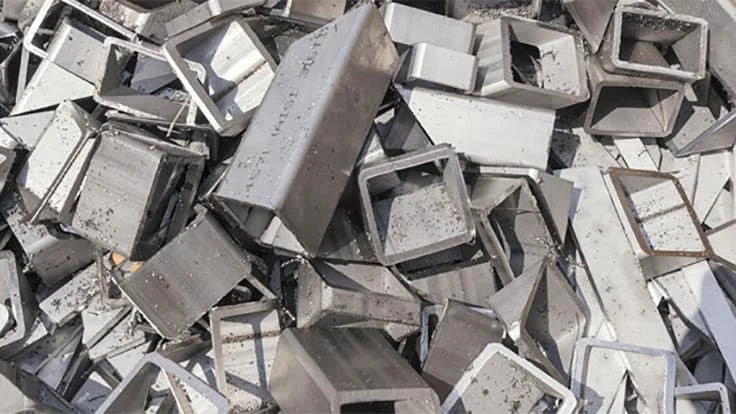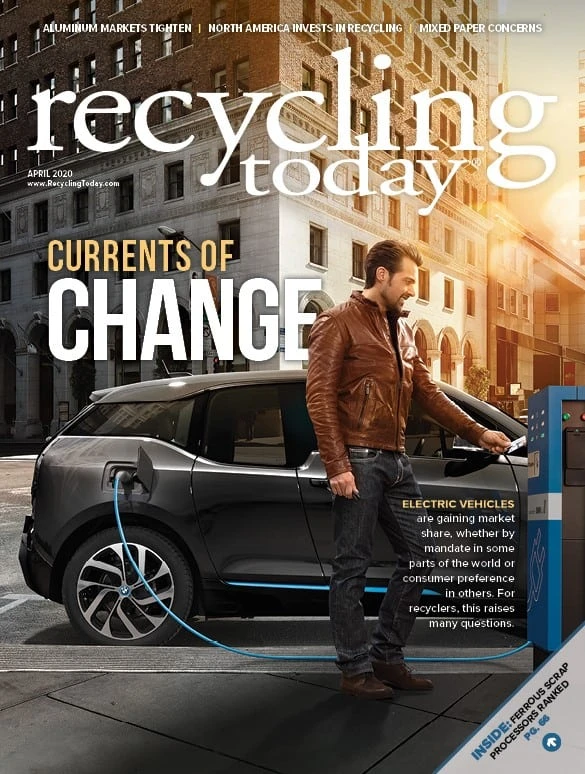
© srki66 / stock.adobe.com

Nonferrous metals markets have been grappling with uncertainty for years now related to the U.S.-China trade war and ongoing reductions in China’s scrap import quotas for copper and aluminum scrap. The situation has led to an excess of aluminum and copper scrap within the U.S. However, as of the start of this year, the domestic market for aluminum scrap seemed to be coming into better balance. News of China’s reclassification of high-quality aluminum scrap as raw material rather than as waste also offered hope to global suppliers as this material will no longer be subject to import quotas.
However, a new source of uncertainty appeared in January as China began responding to the emergence of the novel coronavirus, COVID-19. Manufacturing activity in that country slowed as the Chinese government placed restrictions on travel within China, keeping migrant workers from returning to their jobs following Lunar New Year celebrations.
In this case, when China sneezed (though coughed is more accurate), the rest of the world got sick as the outbreak spread to South Korea, Italy and other nations. The World Health Organization (WHO) labeled the virus a pandemic March 11. As of mid-March, 193,475 confirmed cases of COVID-19 had been reported globally, according to the WHO, and the death toll had risen to more than 7,800. In total, 164 countries, areas or territories had reported cases, with the U.S. and Canada among the countries that have asked residents to practice social distancing. The U.S. and Canada also have temporarily closed their joint border to “nonessential traffic.” (At nearly 4,400, the U.S. ranks eight in terms of the total number of reported cases, while Canada had approximately 450 reported cases as of mid-March.)
While a trader for a Midwest-based scrap processing company says he has not seen a coronavirus-related effect on supply and demand as of early March, he adds, “Certainly, it’s impacting the terminal markets given the increasing fear of a global slowdown in terms of manufacturing.”
As of mid-March, that fear was becoming more tangible as automakers in Europe and the United States announced that they would be halting production temporarily in response to the outbreak. While those announcements were made in mid-March, aluminum scrap processors and traders were already noticing that generation had slowed.
Slower generation
“Scrap generation is a little slow but, overall, pretty steady,” an aluminum scrap broker based in the Midwest says. “Lower steel prices have hurt the flow of retail scrap, and recently coronavirus fears have slowed down some industrial production of scrap.”
The trader for a scrap processing company based in the Midwest also points to a decrease in retail sales. “For the most part, we have seen our industrial sectors hold steady with slightly declining obsolete scrap coming into our yards,” he says. “The all-in value of most every product has discouraged a bit of that activity. But manufacturing sectors prevalent in our region remain pretty strong,” the trader says, citing auto, recreational vehicle and boat manufacturers in particular.
A source with a West Coast-based scrap processor says his company has seen a “slight slowdown in scrap generation,” which he attributes to trouble at Boeing and with the aerospace sector in general.
In January, Boeing suspended manufacturing of its 737 Max planes, which have been grounded worldwide for a year following two fatal crashes. The company had manufactured 400 planes it was unable to deliver because of questions that remain regarding the crashes.
On top of those issues with the 737 Max, Boeing has sought at least $60 billion to assist the aerospace industry as it struggles with declining demand arising from the coronavirus pandemic.
Boeing, which is based in Chicago, said it would apply any government funding it receives to “payments to suppliers to maintain the health of the supply chain,” which consists of roughly 17,000 companies, according to CNBC.
Strengthening domestic demand
While the supply side of the aluminum scrap equation may be somewhat softer, the demand side has strengthened, according to most sources.
The West Coast-based source says, “For the first time in two years, we are seeing a larger demand than supply. Particularly in the extruder area, new capacities built over the last few years are coming online.”
He’s referring to two new cast houses in Los Angeles and in Tijuana, Mexico, at facilities that previously only ran presses.
The broker based in the Midwest, however, describes demand as just “OK,” adding, “but I think there is an issue with people not delivering on units they have sold to us. What happened last year is that fewer domestic mills were willing to lock up all or most of their needs on formula for 2020, which has led to many consumers needing more scrap in the spot market.”
The broker adds that his company has had no problem getting prompt deliveries, “while four months ago, they were asking us to push out deliveries for two to three months. Things flipped quickly.”
“Most mills are keeping low inventory levels and are able to take deliveries in 30 days,” the trader with the Midwest-based scrap processing company says. “I have not seen the inability to ship like we were seeing this time last year.”
The broker says, “I’m not sure demand is that great, it is just that they are all competing for the same units, and the exporters are being forced to pay tighter spreads to lure the material from the U.S.”
The source on the West Coast also mentions the reluctance to buy on formula at the end of 2019 for 2020 business. “We also hear of some large companies going into the market looking to secure formula business for the rest of the year, something that typically happens at the Chicago roundtable of the prior year,” he says, referring to the Institute of Scrap Recycling Industries (ISRI) Commodities Roundtables, which takes place annually in Chicago in September. “It is my impression that what they thought was plentiful supply has tightened, and they are now looking for units.”
“Mills are using more scrap in the product mix than ever before, so demand is strong, for sure,” the trader based in the Midwest says. “The caveat is that the market is so well-supplied, so mills are in a position of relative power to the numbers they are quoting. So, processors have to be smart about how they sell and how they separate themselves from a competitive supply market.”
An aluminum scrap processor based in the Southwest says it seems like domestic consumers are still interested in buying, but pricing has become an issue and even getting pricing from consumers has been more difficult. “The sales side is sluggish,” she says. “I think we are looking for a few months of sales being sluggish.”
The trader with the Midwest-based processing company describes spreads as “transitional.”
He adds, “Again, as I mentioned before, mills want a lot of scrap, but they want it at their number. And they are leveraging the market supply to get their number. But the flip side is the terminal markets are causing the all-in value of that scrap to decrease, which could cause suppliers to ‘hoard’ metal a bit more.”
The trader says he thinks he’s already seen hoarding across some secondary commodities, such as used beverage cans, siding and other lower value items.
The Midwest-based broker says some aluminum scrap grades are faring better than others. While demand for aerospace alloys has softened, likely because Boeing has cut orders, demand for extrusions and billet-maker grades has increased. “I think that is because so little was tied up on formula for 2020,” he explains.
Fluid export demand
Regarding export demand, the Midwest-based trader says he finds it “pretty fluid” as of early March, adding that overseas buyers are always looking for bargains on siding and mixed auto alloys.
Sponsored Content
Labor that Works
With 25 years of experience, Leadpoint delivers cost-effective workforce solutions tailored to your needs. We handle the recruiting, hiring, training, and onboarding to deliver stable, productive, and safety-focused teams. Our commitment to safety and quality ensures peace of mind with a reliable workforce that helps you achieve your goals.
The processor based in the Southwest says her company does “a lot of business in Mexico” and aluminum scrap continues to flow “just fine” into that country as of mid-March.
The brokerage company contact says export buyers have been “aggressive on lower quality segs, painted siding and MLC (mixed low copper).
“It’s harder for them to compete on the higher value segs,” such as 5052 and 3003, he continues.
The West Coast-based source characterizes export demand as “healthy,” though he adds that it has been off in late February and early March in light of the virus-related panic.
However, he says his company sees China’s demand starting to ramp up with the country’s reclassification of some high-quality scrap that is planned for July.
The new standards and accompanying reclassification are considered essential to the nonferrous scrap trading sector since China’s government has announced its intention to completely ban the import of “solid waste” by the end of 2020.
In addition to the reclassification, the Chinese government announced in mid-February that it would allow Chinese buyers to apply for tariff exceptions on imports of aluminum and copper scrap from the U.S. beginning in March.
Fastmarkets Metal Bulletin says the move was taken “to better meet the increasing needs of consumers in China,” particularly in the wake of the COVID-19 outbreak, according to a notice from China’s Ministry of Finance Customs Department. Beginning in July, Chinese importers of aluminum scrap that receive the exception can buy from the U.S. without paying the 25 percent tariffs.
Viral effect
While the fallout from the COVID-19 outbreak and its effect on the aluminum supply chain cannot yet be determined, sources are expecting to be affected.
“We feel it will be a four-to-six-week drought as an increasing amount of companies are looking to close or shutter,” the source on the West Coast says of aluminum scrap supply. “The effect is taking us into the second quarter, with stability in uptake in the second half of the year.”
Get curated news on YOUR industry.
Enter your email to receive our newsletters.

Explore the April 2020 Issue
Check out more from this issue and find your next story to read.
Latest from Recycling Today
- AF&PA report shows decrease in packaging paper shipments
- GreenMantra names new CEO
- Agilyx says Styrenyx technology reduces carbon footprint in styrene production
- SABIC’s Trucircle PE used for greenhouse roofing
- Hydro to add wire rod casthouse in Norway
- Hindalco to invest in copper, aluminum business in India
- Recycled steel price crosses $500 per ton threshold
- Smithers report looks at PCR plastic’s near-term prospects







